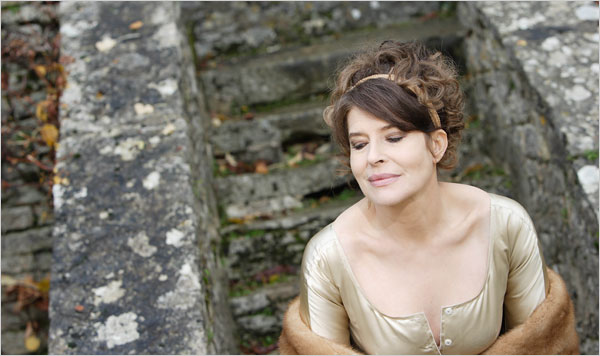|
Reviews of Recent Independent, Foreign, & Documentary Films in Theaters and DVD/Home Video
Written, Produced & Directed by Claude Lelouch Director of Photograhy, Gérard de Battista Edited by Stéphane Mazalaigue & Jean Gargonne Music by Alex Jaffray Released by Samuel Goldwyn Films France. 103 min. Rated R With Dominique Pinon, Fanny Ardant, Cyrille Eldin & Audrey Dana In the first minute alone, director Claude Lelouch packs in two iconic noirish images: the exterior establishing shot of the Parisian Quai des Orfevres police station (bonsoir, Henri-Georges Clouzot), and then in the next shot, French star Fanny Ardant (speaking of iconic) looking directly into the camera during a police interrogation, all filmed in beautiful black and white. Come to think of it, Ardant somewhat resembles Joan Crawford, circa Mildred Pierce. But Lelouch is not simply interested in piling on film references (for that, see Christophe Honoré’s Love Songs or Dans Paris). In his new (and 41st!) film, he moves beyond making a pastiche, thanks largely to two sympathetic sad-sack characters both with a strong sense of self-mockery. In quite a balancing act, he has written a script that’s a thriller, somber romantic comedy, and, for the first half, a tense road movie, the equivalent of a beach or airport novel or, in French, a roman de gare. Half of the fun is the audience’s initial confusion. Switching to color, Lelouch moves 10 years into the past then back to the present and onto the future, balancing three story lines, besides the criminal investigation of Ardant’s Judith Ralitzer, a bestselling novelist. Doe-eyed Huguette, after arguing nonstop with her fiancé all the way from Paris, is auspiciously dumped – he takes off with her car and purse at a highway pit stop. The prodigal daughter was on her way to visit her farming family in the French Alps to introduce her boyfriend. Earlier, on her car radio, the bulletin of an escaped serial rapist who lures his victims through magic tricks, leads the newscast. And back in Paris, a matronly woman goes to the police; her husband has been missing for three days. Blond and statuesque, Huguette is used to attention and tells a man observing her humiliation to piss off. After sleeping on a rest-stop bench all night, she wakes up and the stranger’s still there, sipping coffee. He attempts to cheer her up, taking out a deck of cards, performing a trick. She relents and takes him up on his offer of a lift (her boyfriend hasn’t returned any of her teary phone calls). Pierre, her erstwhile Good Samaritan, is played by the well-cast Dominique Pinon, who’s made a career playing oddballs (Delicatessen and Amélie). Here he’s the main, and unsettling, piece of Lelouch’s puzzle. Pinon’s soft blue eyes contrast with the rest of his face, with his nose, mouth, and lips scrunched forward – he’s not homely, just a bit off, a more likely choice as an all-out villain than a charming leading man. When Pierre eventually arrives with Huguette to her destination, Lelouch deftly provides the year’s most sinister (so far) scene: a wide shot of Pierre and Huguette’s attractive teenager daughter walking together into the overcast hillside while the squeals of a butchered hog (thankfully not seen) drowns all other sounds. The director later disarms the tension with a comical and concisely written dinner scene of awkward conversation straight out of an Alan Ayckbourn play.
You might feel manipulated by all the movie’s twists and turns if not for the chemistry between the neurotic Huguette and the calming Pierre. However,
there’s not enough of Ardant. Elegantly outfitted, whether in a Burgundy vineyard or cruising Cannes on a yacht, she’s the typical Lelouch woman, but
Ardant’s regal and imposing superstar novelist is described rather than seen as dangerous. She’s ruthless, yes, but even Pierre points out that all
novelists are predictors. This lack of a threat on her part is only a small gap in this otherwise classy piece of pulp. Too bad this isn’t playing at
Manhattan’s IFC Film Center; its popcorn with truffle oil would go well with Lelouch’s yarn.
Kent Turner
|

